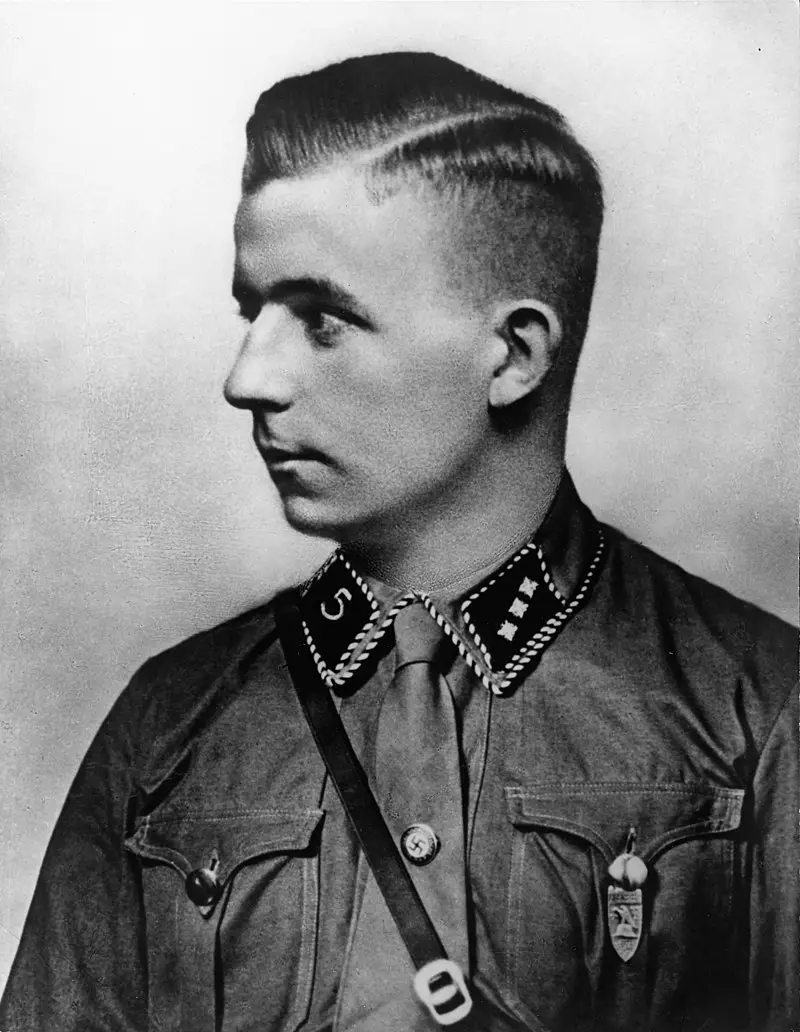Horst Wessel
(1907 - 1930)

Horst Wessel was born October 9, 1907, in Bielefeld, Germany. The son of a pastor, Wessel dropped out of law school in 1926 and defied his mother by joining the Nazi Brownshirt paramilitary in the final days of the Weimar Republic. He soon caught the attention of Joseph Goebbels, who sent him to Vienna in 1928 to organize the Nazi youth movement there.
Intelligent and politically astute, Wessel was also extremely violent. Upon returning to Germany, he organized an attack on the local headquarters of the Communist Party in Friedrichshain, Berlin, during which four workers sustained serious injuries. This prompted Heinz Neumann, editor of the Communist Red Flag daily to call on party members to "Beat the fascists wherever you find them," exacerbating the already tense political situation.
On January 14, 1930, Wessel got into a heated argument with his landlady, the widow of a Communist Party member. Although the exact details of the argument are still debated, what is known is that: 1) she claimed Wessel refused to pay his rent — alternately, she may have tried to raise it and Wessel refused to pay the difference; 2) she claimed he threatened to beat her; 3) Wessel refused to pay rent for his girlfriend, a prostitute (according to some accounts, a former prostitute reformed by Wessel); since the landlady was herself subletting to Wessel, she feared she would lose the rights to her apartment because a prostitute was living there. Rather than approach the police, the landlady went to a local tavern frequented by Communists for help.
The Communists saw this as an ideal opportunity to avenge themselves on Wessel for the earlier attack. Two men, Ali Höhler, a tough with underworld connections, and Erwin Rückert, an active party member, went to Wessel's apartment. When he opened the door for them, Höhler shot him in the head. He died several weeks later from his injuries.
The shooting was immediately exploited by both the Nazis and the Communists to further their political aims. The Communists portrayed Wessel as a pimp, while the Nazis claimed he had actually saved his girlfriend from a life of prostitution by introducing her to the Nazi Party and its values. Goebbels organized a public funeral for the new "martyr" to the Nazi cause, and 30,000 people lined the streets of Berlin to see the procession. Goebbels delivered the eulogy in the presence of Hermann Göring and Prince August Wilhelm of Prussia. During the Nazi era, his life was glorified in memorials, books, and films.
Some months before he died, Wessel had written the verses to what would become the "Horst Wessel Lied" but it first gained popular currency when a choir of Stormtroopers performed it at his funeral. It was later recorded, and in 1931 it became the official anthem of the Nazi Party, played alongside Deutschland über Alles at all official occasions. The song celebrates the SA (whom Hitler would soon purge in the Night of the Long Knives).
Sources: Louis Snyder, Encyclopedia of the Third Reich, (Marlowe & Co., 1997).
What-Means.Com.
This article is available under the terms of the GNU Free Documentation License.
Photo: Bundesarchiv, Bild 146-1978-043-14 / Heinrich Hoffmann / CC-BY-SA 3.0, CC BY-SA 3.0 DE via Wikimedia Commons.


